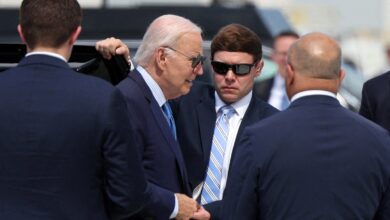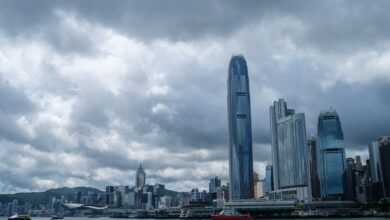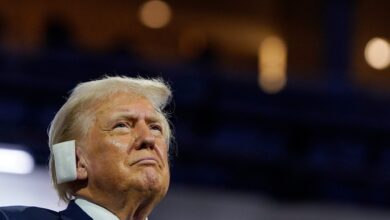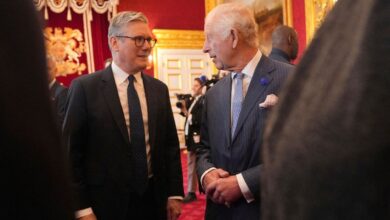Q&A: DR Congo election chief on ‘unfair’ criticism and vote preparedness
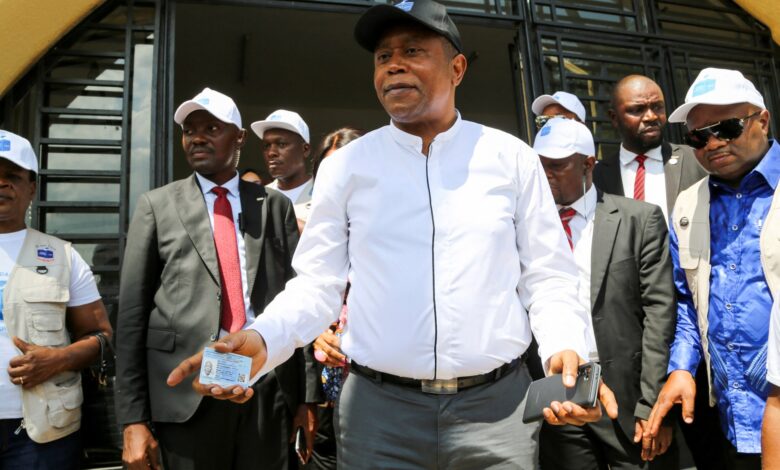
Kinshasa, DRC – This Wednesday, millions of Congolese citizens vote in one of the most anticipated elections of 2023. The high-stakes vote could represent the second peaceful civilian-to-civilian transition in the Democratic Republic of the Congo’s history since independence from Belgium in June 1960.
There have been mounting concerns about transparency, especially after the European Union observer mission pulled out and hundreds of thousands of people in areas in the volatile east are unable to vote because of spiralling insecurity from armed groups.
Al Jazeera spoke to Denis Kadima, president of the Independent National Electoral Commission (CENI) on its readiness for the election, in the capital, Kinshasa.
Excerpts from the interview:
Al Jazeera: How prepared are you for the elections on Wednesday?
Denis Kadima: The process is going well. We have faced a lot of challenges. The first came because we were appointed very late – 28 months of delay in appointing our team made it very hard for us. But we have been able to do everything that is required to run an election, starting with voter registration up to where we are now.
And we have managed to do it in a short period because our election calendar is very restrictive, and we could not waste a single day. Otherwise, the process will be in danger. We have made huge progress. We have deployed in most of the country.
Of course, there are always areas that are hard to access. In some of the provinces, you have swamps, mountains, rivers, no good roads or bridges, and so on. So that’s why, at some stage, I requested the government to give us helicopters so we can move faster.
And these have only started coming now, which is a bit late, but everything that comes our way, we take it. Broadly speaking, I can say that despite these major challenges, the process is on track. But this is a cyclical issue. Five years ago, during that election, we were talking about the same issues.
Al Jazeera: What do you think needs to be done going forward to make sure that CENI is prepared effectively to handle an election like this?
Kadima: First of all, the appointment of the commission is a very lengthy and complicated process that can paralyse the country. So we need to have a simpler way of doing it.
Besides that, we can’t be holding elections during the rainy season. So they should push it toward July, when it’s dry season.
Apart from that, in the long term, we must have better infrastructure because everything is done by plane; because the country is big and the roads are not good. In addition to that, funding has been coming slowly and this has resulted in us being unable to send the goods by sea.
We do almost everything by air and that comes with a huge cost. We need to draw lessons from one process to the other and find the time to correct by learning from what’s happened before.
But we don’t always have everything that we want. This year, the government had quite some treasury problems. So that’s why it happened that way.
Al Jazeera: So with the resources that you have, do you think that you can pull off a credible election?
Kadima: If you give me $100, I’ll run a good election, but if you only give me $50, I’ll still run an election. We try to do as much as we can to hold quality elections. One of our objectives is to improve from one cycle to the next. We can’t display the weaknesses of the past. Of course, if we have money earlier, we can do better.
If it comes late, the quality may suffer. But ultimately, we are a developing country. We still need to sustain our elections which costs too much. Some of the things, if they are done on time, will cost less.

Al Jazeera: Some Congolese have complained about the electoral process so far.
Kadima: I think they are being unfair. There are political groups in this country that are not ready for elections because they never believe that we’ll pull it off in such a short period. Their strategy all along has been to discredit the process; no matter what we do, they will never acknowledge what we’ve done. There are even civil society groups, whose leaders, many of whom were candidates for this position I’m in and they tend to be subjective.
The Catholic Church has its own candidates. The Protestant Church had its own candidates. But I was the lucky one, and maybe they just want to prove a point to show that they were right when they didn’t want me. But it was just a political game in which I had the upper hand. But I believe that the best way to assess us is to compare where we are coming from: 2011, 2018 and 2023.
Throughout this process, you will see a lot of openness. We have been very inclusive. People who are in exile, unable to submit their candidacy papers, today they are candidates.
We have … gone from 35,000 candidates in 2018 to 100,000 candidates this year. That’s how open it is. We recommended to parliament to make long-term observation of elections part of the legal framework because we believe observers have a role to play in the transparency of the process.
We were the ones who told people that there were 3.3 million people who should not have been on the voters’ list because they’ve registered more than once, some are underage, etc. For the results, we are going to publish them, polling station by polling station. We’ve tried very hard and you can see that the criticism that we get tends not to be always genuine.
In an electoral process, if you want to see if the commission is working fairly or not, you need to see if the problems occurring during the process are affecting only some groups and not others. If you look at every problem we’ve had, it has affected the whole country equally and when we solve it, we also solve it equally. And I think many are appreciative, apart from those politicians who have decided that they need this process to be blocked so they can have some kind of dialogue that will culminate in the formation of a government of national unity. I don’t think this country needs to go through that kind of uncertainty.
Al Jazeera: Some politicians asked the Constitutional Court for postponement of the elections and that has been denied. Is that something you would consider if, in these few days, everything is not in place?
Kadima: We don’t want postponement simply because in this country we must build a routine of holding elections periodically but also on time. There will always be problems to address even if they give us six more months because it may be a problem of funding or security. There will always be some problems, but we must move forward.
I’m not saying that we must neglect aspects of the process just to meet the deadline. We have done the maximum with the resources that we got within the timeframe that we had, which was short. [But] the country has more to gain by holding to the date than if we had to postpone.
Many of those who are saying postpone, if it happens, they’ll be the first to stand up and say, oh, you should not have postponed and then they will create more problems. There will always be some problems, but we’ll address them as they unfold.
Al Jazeera: In the east, 6.5 million people are displaced and many were unable to register or go back home to vote. What do you say to this?
Kadima: The law, the way it is designed, you have broadly two types of displaced people. The first group is made up of those people who go to their relatives. Those ones we register as if they were residents of those places. But those who are in IDP camps are registered and allocated to the area they came from.
As a result, because they are supposed to be in those camps temporarily, they are supposed to vote at their homes. But unfortunately, the situation became even worse and they found themselves running again and it’s not sure that they’ve gone back to those camps. They may have gone to some other places. It has just made it very complicated for us to trace them back. But the bottom line is when we recover peace, they may have missed the presidential election, but they will be able to participate in the [elections to] National Assembly, provincial assemblies, and local councils as well.
That’s the price to pay, but as a country, we are the victim. We can’t be blamed for what happened to our countrymen and women.
Al Jazeera: How do you stay fair to everyone involved as CENI president?
Kadima: Everyone will always blame you for something. It’s a lot of pressure and responsibility. With that number of people, 100,000 candidates, only a couple thousand people will be elected.
All these others will hate us because they won’t make it. No one ever accepts defeat. So those are the realities. But it’s part of the culture that we need to build along the way. We need to make elections a routine where people understand that I may lose now, [but] in five years, if I learn from my mistake, I’ll win. And the more we do it, the more people will start internalising such democratic [principles].
The interview has been slightly edited for brevity.
